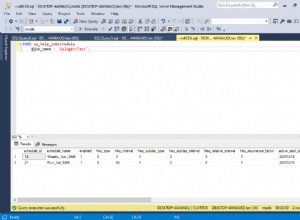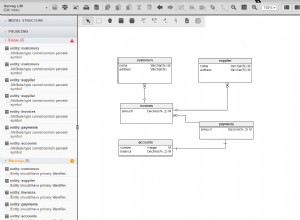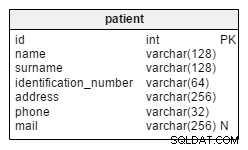A
pg A biblioteca fornece suporte completo para a API assíncrona do PostgreSQL. Adicionei um exemplo
de como usá-lo para as samples/ diretório:#!/usr/bin/env ruby
require 'pg'
# This is a example of how to use the asynchronous API to query the
# server without blocking other threads. It's intentionally low-level;
# if you hooked up the PGconn#socket to some kind of reactor, you
# could make this much nicer.
TIMEOUT = 5.0 # seconds to wait for an async operation to complete
CONN_OPTS = {
:host => 'localhost',
:dbname => 'test',
:user => 'jrandom',
:password => 'banks!stealUR$',
}
# Print 'x' continuously to demonstrate that other threads aren't
# blocked while waiting for the connection, for the query to be sent,
# for results, etc. You might want to sleep inside the loop or
# comment this out entirely for cleaner output.
progress_thread = Thread.new { loop { print 'x' } }
# Output progress messages
def output_progress( msg )
puts "\n>>> #{msg}\n"
end
# Start the connection
output_progress "Starting connection..."
conn = PGconn.connect_start( CONN_OPTS ) or
abort "Unable to create a new connection!"
abort "Connection failed: %s" % [ conn.error_message ] if
conn.status == PGconn::CONNECTION_BAD
# Now grab a reference to the underlying socket so we know when the
# connection is established
socket = IO.for_fd( conn.socket )
# Track the progress of the connection, waiting for the socket to
# become readable/writable before polling it
poll_status = PGconn::PGRES_POLLING_WRITING
until poll_status == PGconn::PGRES_POLLING_OK ||
poll_status == PGconn::PGRES_POLLING_FAILED
# If the socket needs to read, wait 'til it becomes readable to
# poll again
case poll_status
when PGconn::PGRES_POLLING_READING
output_progress " waiting for socket to become readable"
select( [socket], nil, nil, TIMEOUT ) or
raise "Asynchronous connection timed out!"
# ...and the same for when the socket needs to write
when PGconn::PGRES_POLLING_WRITING
output_progress " waiting for socket to become writable"
select( nil, [socket], nil, TIMEOUT ) or
raise "Asynchronous connection timed out!"
end
# Output a status message about the progress
case conn.status
when PGconn::CONNECTION_STARTED
output_progress " waiting for connection to be made."
when PGconn::CONNECTION_MADE
output_progress " connection OK; waiting to send."
when PGconn::CONNECTION_AWAITING_RESPONSE
output_progress " waiting for a response from the server."
when PGconn::CONNECTION_AUTH_OK
output_progress " received authentication; waiting for " +
"backend start-up to finish."
when PGconn::CONNECTION_SSL_STARTUP
output_progress " negotiating SSL encryption."
when PGconn::CONNECTION_SETENV
output_progress " negotiating environment-driven " +
"parameter settings."
end
# Check to see if it's finished or failed yet
poll_status = conn.connect_poll
end
abort "Connect failed: %s" % [ conn.error_message ] unless
conn.status == PGconn::CONNECTION_OK
output_progress "Sending query"
conn.send_query( "SELECT * FROM pg_stat_activity" )
# Fetch results until there aren't any more
loop do
output_progress " waiting for a response"
# Buffer any incoming data on the socket until a full result
# is ready.
conn.consume_input
while conn.is_busy
select( [socket], nil, nil, TIMEOUT ) or
raise "Timeout waiting for query response."
conn.consume_input
end
# Fetch the next result. If there isn't one, the query is
# finished
result = conn.get_result or break
puts "\n\nQuery result:\n%p\n" % [ result.values ]
end
output_progress "Done."
conn.finish
if defined?( progress_thread )
progress_thread.kill
progress_thread.join
end
Eu recomendo que você leia a documentação em PQconnectStart e o Processamento de comando assíncrono seção do manual do PostgreSQL e compare com o exemplo acima.
Eu não usei o EventMachine antes, mas se ele permitir que você registre um soquete e retornos de chamada para quando ele se tornar legível/gravável, acho que seria bastante fácil integrar chamadas de banco de dados nele.
Estou querendo usar as ideias em Artigo de Ilya Grigorik sobre o uso de fibras para limpar código de eventos para tornar a API assíncrona mais fácil de usar, mas isso está longe. Eu tenho um ticket abrir para rastreá-lo se você estiver interessado/motivado para fazê-lo sozinho.




